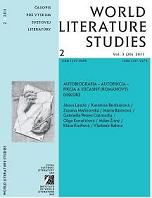(Ne)možnosti autobiografie v diele Karla Čapka Obyčejný život
(Im)Possibilities of Autobiography in Karel Čapek‘s “Obyčejný život“
Author(s): Gabriella Csizmadia PetresSubject(s): Literary Texts
Published by: SAV - Slovenská akadémia vied - Ústav svetovej literatúry
Keywords: Autobiography. Quasi-autobiography. Anti-autobiography. Meta-autobiography. Heterogeneous subject. Distorting memory.
Summary/Abstract: The paper interprets “Obyčejný život”, a work by Karel Čapek in the context of late 20th century autobiography theories. Previous interpretations are more or less dominated by the so called noetic aspects, however, the autobiographical difficulties raised by the work, the impossibility of imagining life as narration, and facing the multi-facetedness of the self raise the possibility of employing autobiographical considerations. An interesting feature of the analysed work is that it includes an embedded story, an autobiographical text, which has a double structure: the first part includes a traditional autobiography that is a quasi-autobiography; the second part consists of the dismantlement, rethinking and re-evaluation of the first part. Therefore, I call the second part an anti-autobiography, its aim is to liberate the autobiographer from his illusions about the workings of an autobiography and to point at the failure of idealized preconceptions about life story narration. An anti-autobiography works as metaautobiography, and rewrites the relationship of the autobiography and the autobiographer, it intends to riddle the autobiographer’s myth about his/her own autobiographer: it points at the fact that the autobiographer works with a distorting memory instead of a precise one and employs metaphorical narration instead of metonymical, presents only life fragments instead of a whole life story and instead of a homogeneous self it presents a multiple, heterogeneous subject.
Journal: World Literature Studies
- Issue Year: III/2011
- Issue No: 2
- Page Range: 61-69
- Page Count: 9
- Language: Slovak

